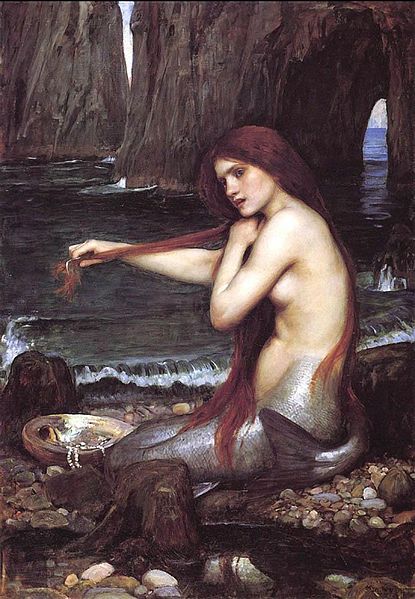
There are so many fairy tales and folktales out there that sometimes it’s hard to pick one to feature every Thursday. Yes, there’s always another Grimm, but I like to add variety. Today, I decided on a mermaid tale, and I have a reason. In the book I’m listening to now, Bad Wolf by Nele Neuhaus, one of the victims, a drowned girl whose identity is unknown, keeps being referred to as The Mermaid.
“Touched by Iron” is a sad Welsh tale that came up when I was searching for mermaid stories. It was retold by Wirt Sikes in British Goblins: Welsh Folk-lore, Fairy Mythology, Legends, and Traditions, 1880. You can read it here.
A farmer’s son was watching the sheep on a foggy day when crossing a marshy meadow he saw a beautiful lady behind Coed farm was one foggy day looking after his father’s sheep, when crossing a marshy meadow he saw a lovely lady. She had yellow hair, blue eyes and rosy cheeks. He approached her, and asked permission to speak to her. She smiled sweetly and said to him, “Idol of my hopes, you have come at last!”
After that, they met daily along the meadows. Sometimes the young man would be gone for days, no one knew where, and his friends whispered to each other that he had been “witched.” He wanted to marry her.
Around the lake, Llyn y Dywarchen, was a grove of trees, and under one of these the fairy lady promised to marry him. Now, he had to have her father’s permission. The father agreed to meet with the young couple one night. After the moon disappeared behind the hill, the father and young lady both came to the appointed spot and the father immediately gave his consent to the marriage, under one condition, that her future husband should never hit her with iron. “If ever thou dost touch her flesh with iron she shall be no more thine, but she shall return to her own.”
The two were married and were very happy. They had several wonderful children and as the lady had brought money with her to the marriage, they were quite wealthy.
After some years, the two were out riding one day, when the lady’s horse sank in a deep mire. Her husband hurried to help her, but in the process the stirrup of the saddle hit her knee. Immediately voices were heard singing on the brow of the hill, and she disappeared, leaving her husband and children behind. It was entirely by accident, but iron did touch her skin and the consequence was unavoidable.
She and her mother devised a plan so she could see her beloved husband, but as she was not allowed to walk on the earth any longer. They floated a large piece of land on the lake, and on this turf she spent hours “holding converse” with her husband. I’m going to assume that in this case, the phrase means having sex with her husband, in addition to talking, at least I hope so. This continued until his death.
I think it’s sad because he was trying to help her. He didn’t “hit her” with the iron, was not abusive or unloving in any way that we know of. At least they managed to still spend time together.
I found this brief article on Llyn y Dywarchen by Simon Topham that I thought was interesting. It shows where a portion of the tale may have come from.
This is a privately owned lake beside the B4418 (a road, I assume) which has a rather complex shape and a small island in the centre, which is not uncommon in highly glaciated areas. There is a curious story attached to this lake. Once upon a time Llyn-y-Dywarchen had an additional floating island. Giraldus Cambrensis in 1188 told of the lake ‘having a floating island in it which is driven from one side to the other by the force of the wind’. His explanation at that time was perfectly rational. ‘A part of the bank naturally bound together by the roots of willows and other shrubs may have broken off and being continually agitated by the winds….it cannot reunite itself firmly with the banks.’
The astronomer and scientist Edmund Halley swam out to the island in 1698 to verify that it did indeed float.
Thomas Pennant in 1784 claimed to have seen the island and confirmed that cattle which strayed upon it when it was near the shore were occasionally marooned when it began to move.
The island is no longer there, and its legend has died….unless another knotted clump of the bank detaches itself and floats around in the future.
Thursday’s Tales is a weekly event here at Carol’s Notebook. Fairy tales, folktales, tall tales, even re-tellings, I love them all.

This one was sad :/